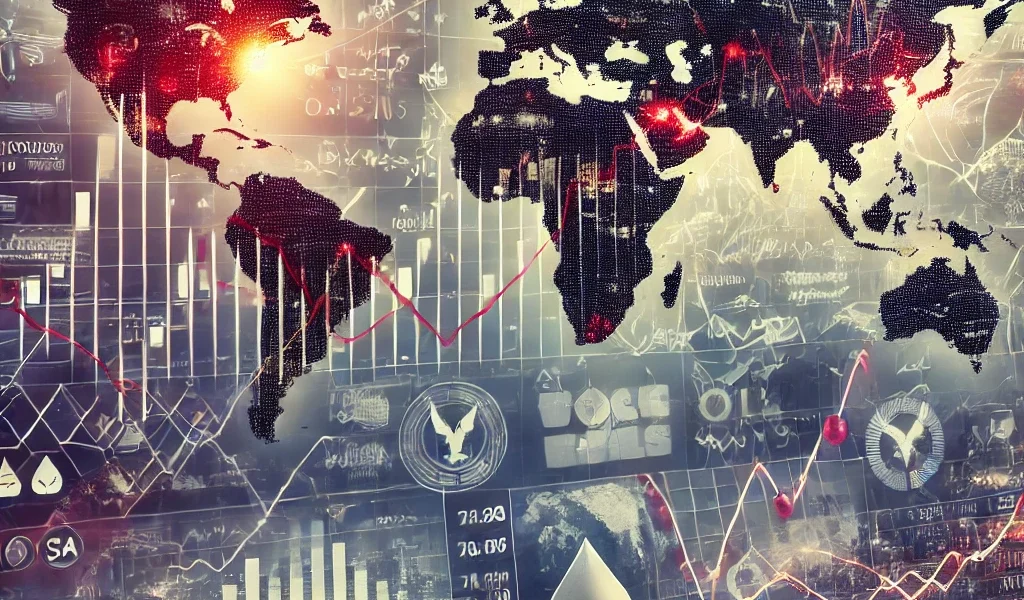Introduction
Geopolitical events, including wars, trade disputes, diplomatic tensions, and policy shifts, significantly impact global financial markets. These events can create uncertainty, drive volatility, and affect investor sentiment, leading to fluctuations in stock prices, currency values, and commodity markets.
In this blog, we will explore how geopolitical developments influence global financial markets, examine historical examples, and analyze strategies investors can use to safeguard their portfolios during uncertain times.
1. Understanding Geopolitical Risks in Financial Markets
Geopolitical risk refers to the potential impact of political and international events on economic stability and financial markets. Such risks can arise from:
- International conflicts and wars
- Trade wars and tariffs
- Sanctions and diplomatic tensions
- Regulatory changes and policy shifts
- Elections and political instability
Markets react to these events based on their potential long-term economic effects, investor sentiment, and risk perception.
2. Key Financial Markets Affected by Geopolitical Events
2.1 Stock Markets
Stock markets are often the first to react to geopolitical uncertainty. Investors sell off equities during crises, leading to sharp declines. Conversely, certain sectors like defense, cybersecurity, and energy may benefit from instability.
Example: During the 2022 Russia-Ukraine conflict, global stock indices, including the S&P 500 and the FTSE 100, witnessed volatility due to rising energy prices and investor concerns over economic sanctions.
2.2 Currency Markets (Forex)
Political instability weakens investor confidence, leading to currency fluctuations. Safe-haven currencies like the U.S. dollar (USD), Swiss franc (CHF), and Japanese yen (JPY) tend to appreciate during crises.
Example: In the aftermath of Brexit, the British pound (GBP) fell sharply against the U.S. dollar due to concerns over economic uncertainty in the UK.
2.3 Commodity Markets (Gold & Oil)
Gold is a traditional safe-haven asset, often surging in value during geopolitical crises. Oil prices, on the other hand, react to disruptions in supply caused by geopolitical conflicts.
Example: The 1973 Oil Crisis saw crude oil prices quadruple following geopolitical tensions in the Middle East, leading to inflationary pressures worldwide.
2.4 Bond Markets
Government bonds, particularly U.S. Treasury bonds, are seen as safe investments during global uncertainties. As investors shift funds from riskier assets, bond yields drop.
Example: During the 2008 financial crisis, investors flocked to U.S. Treasury bonds, leading to a decline in yields and an increase in bond prices.
3. Historical Examples of Geopolitical Events Impacting Markets
3.1 The 9/11 Attacks (2001)
- The stock market experienced its worst one-day decline in history.
- The airline industry suffered significant losses.
- Gold and oil prices rose sharply due to global uncertainty.
3.2 U.S.-China Trade War (2018-2019)
- Increased tariffs on imports led to market volatility.
- Technology stocks, particularly companies like Apple and Intel, faced losses.
- The Chinese yuan depreciated against the U.S. dollar due to trade tensions.
3.3 Russia-Ukraine War (2022-Present)
- Global energy prices soared due to sanctions on Russian oil and gas.
- European stock markets experienced sharp declines.
- The U.S. dollar and gold strengthened as safe-haven assets.
4. How Investors Can Navigate Geopolitical Risks
4.1 Diversification
Investors should diversify their portfolios across different asset classes, including equities, bonds, commodities, and foreign currencies, to reduce risk exposure.
4.2 Safe-Haven Investments
Allocating a portion of investments to safe-haven assets like gold, U.S. Treasury bonds, and stable currencies can help mitigate losses during uncertain times.
4.3 Hedging Strategies
- Using options and futures: Investors can use derivatives like put options to hedge against potential losses in stock markets.
- Investing in defensive sectors: Healthcare, consumer staples, and utilities tend to be less affected by geopolitical tensions.
4.4 Staying Informed
Keeping track of global news, economic reports, and geopolitical developments can help investors make informed decisions.
Conclusion
Geopolitical events play a crucial role in shaping global financial markets. While crises often lead to increased volatility, understanding how different asset classes react to political instability can help investors make strategic decisions. By diversifying investments, utilizing hedging strategies, and monitoring global events, investors can better manage risks and navigate uncertain times.
As the world becomes more interconnected, geopolitical risks will continue to influence financial markets, making it essential for investors to stay informed and prepared.




